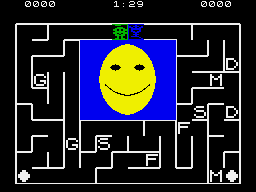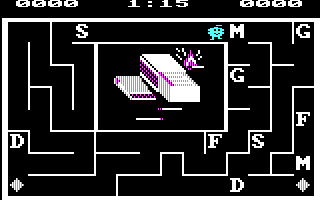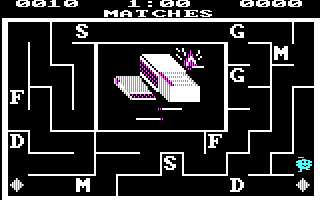Retro Replay Review
Gameplay
Alphabet Zoo delivers an energetic blend of maze navigation and letter-collecting action that keeps players engaged from start to finish. In each top-down labyrinth, you race against the clock to gather the scattered letters, weaving between walls and avoiding stand-still moments. The inclusion of two teleporters at random spots adds a delightful twist—stepping on one can whisk you to an unexpected corner, requiring quick adaptation and split-second decision-making.
The game offers two distinct modes to suit different skill levels and learning objectives. In Game 1, you repeatedly collect the first letter of the featured object’s name as many times as possible before time expires. This mode excels at reinforcing letter recognition and speed. Game 2 raises the stakes: you must gather every letter of the object’s name in the correct sequence, turning each maze into a puzzle of memorization and route optimization.
Multiplayer fans will appreciate the head-to-head challenge in two-player mode. Whether sharing a controller locally or passing devices, competing to finish first injects a healthy dose of rivalry. Furthermore, the ability to start from any level empowers players to pick up right where they left off or to jump into the most challenging mazes immediately.
Customization is another hallmark of the gameplay experience. You can choose to collect uppercase letters exclusively, focus on lowercase, or tackle a mixed bag. This flexibility makes Alphabet Zoo suitable for a wide range of ages and learning stages, from early readers just recognizing their ABCs to more advanced learners solidifying their spelling and sequencing skills.
Graphics
Visually, Alphabet Zoo adopts a cheerful, cartoon-style aesthetic that appeals to younger audiences without feeling cloying. The crisp, colorful walls of each maze contrast nicely with the bold letter tiles, ensuring everything is easily distinguishable even on smaller screens. The bird’s-eye layout provides a clear view of pathways, teleporters, and the central object graphic.
Each level’s centerpiece—whether it’s a playful penguin, a zesty zucchini, or a slithering snake—is rendered in bright, inviting hues that reinforce the educational theme. These object illustrations aren’t just decorative; they serve as constant visual cues, reminding players of the word they’re spelling out. In Game 1, the repeating first-letter prompt ties back to that central image, reinforcing object-letter associations.
Teleporters are marked with pulsing colors and subtle animations, ensuring players can’t miss them. When activated, the screen momentarily flashes, signaling the warp in progress. This small visual flourish goes a long way in maintaining excitement, preventing the experience from becoming too static or predictable.
While Alphabet Zoo doesn’t push console-level graphics, its art style is perfectly suited to its educational purpose. The clean lines, uncluttered HUD, and intuitive iconography make it a breeze for parents and teachers to guide kids through early letter-learning adventures without overwhelming them with visual noise.
Story
Alphabet Zoo doesn’t rely on a deep, narrative‐driven plot; instead, it invites players into an imaginative world where letters come to life in a sprawling zoo of words. Each maze is themed around a familiar object or animal, providing a simple yet effective storyline: explore the pen, collect the letters, and learn the word. This straightforward premise offers enough context to keep young players motivated.
The notion of a “zoo” provides a loose framing device for progression. As players advance, they “visit” new enclosures, each housing a different object to spell out. Though there are no cutscenes or voiced characters, the steady reveal of new items and letter challenges creates its own sense of discovery and delight.
In lieu of a traditional plot, Alphabet Zoo weaves educational goals into its gameplay loop. The narrative—such as it is—centers on mastering each word, improving reaction times, and outpacing competitors. This functional approach to storytelling aligns perfectly with the game’s mission: to entertain while building literacy skills.
Overall Experience
Alphabet Zoo strikes a compelling balance between entertainment and education. Its fast-paced mazes and teleportation surprises keep gameplay fresh, while the two distinct modes ensure that players can focus on letter recognition, sequencing, or a combination of both. Whether tackling a time trial in Game 1 or carefully plotting each step in Game 2, there’s a satisfying sense of progress with every collected letter.
The game shines in both solo and competitive settings. Single players will find it an engaging way to practice the alphabet, and the customizable options let parents or teachers tailor the challenge to a child’s skill level. On the flip side, two-player matches foster friendly competition that can spur improvement in both speed and accuracy.
While the graphics and story elements remain intentionally simple, they serve the educational design brilliantly. The object-centered mazes, vivid letter icons, and playful teleport visual cues create an inviting learning environment. Some older players may crave a more elaborate narrative or advanced graphical flair, but for the target audience of early readers, Alphabet Zoo hits all the right notes.
In summary, Alphabet Zoo is a well-crafted educational title that marries classic maze gameplay with alphabet learning. Its variety of modes, adjustable difficulty, and vibrant presentation make it a standout choice for parents, classrooms, and casual gamers seeking both fun and literacy development. The unpredictable teleporters provide memorable moments of excitement, ensuring that each session remains as engaging as the first.
 Retro Replay Retro Replay gaming reviews, news, emulation, geek stuff and more!
Retro Replay Retro Replay gaming reviews, news, emulation, geek stuff and more!









Reviews
There are no reviews yet.